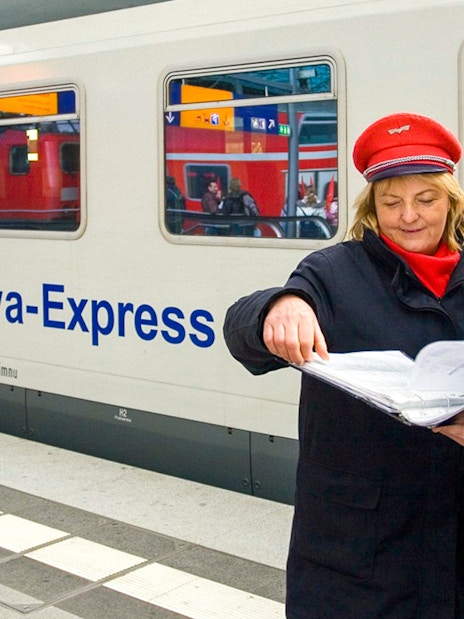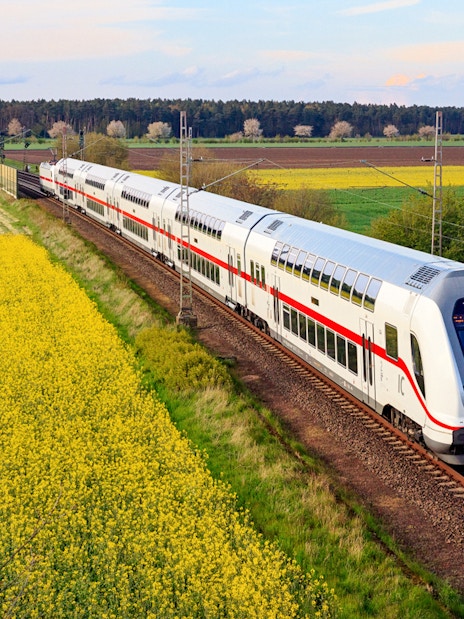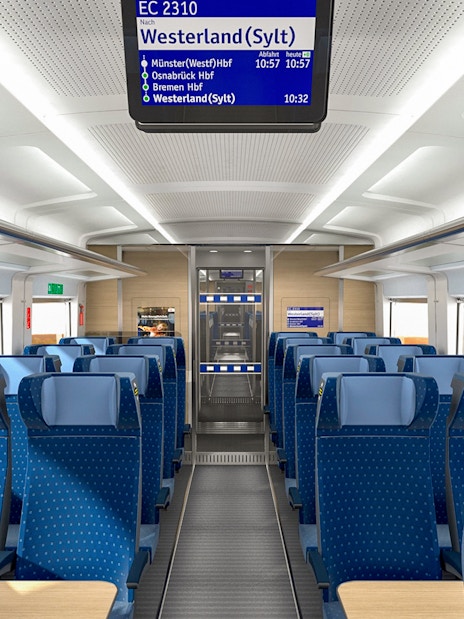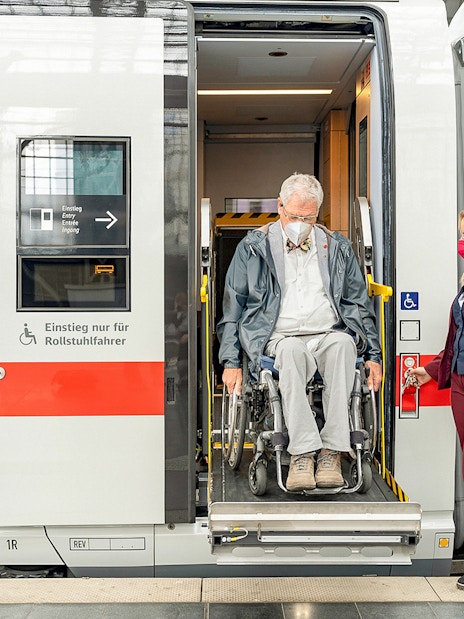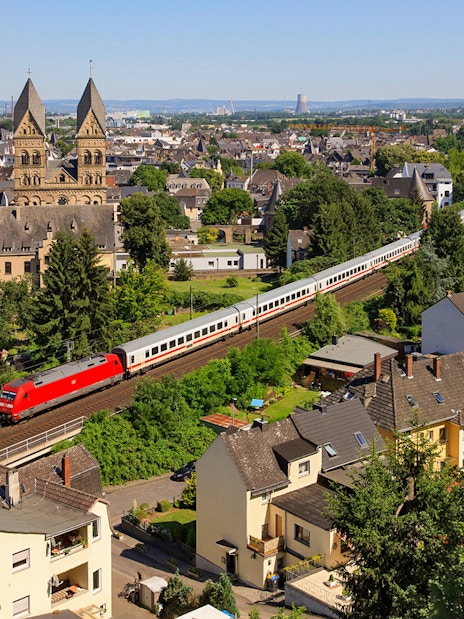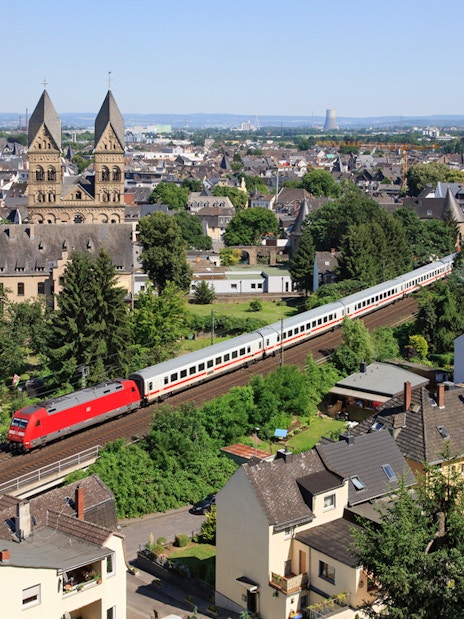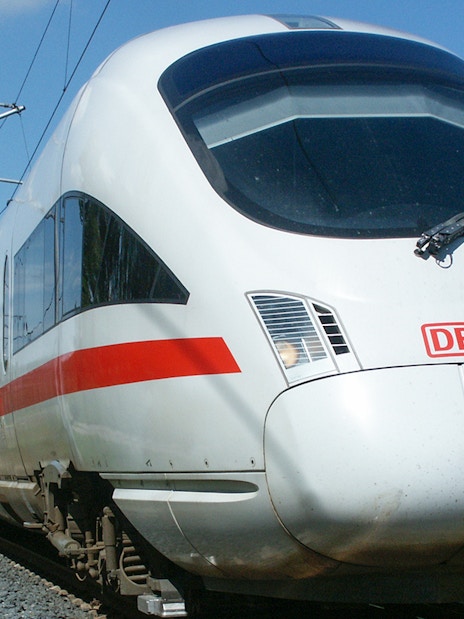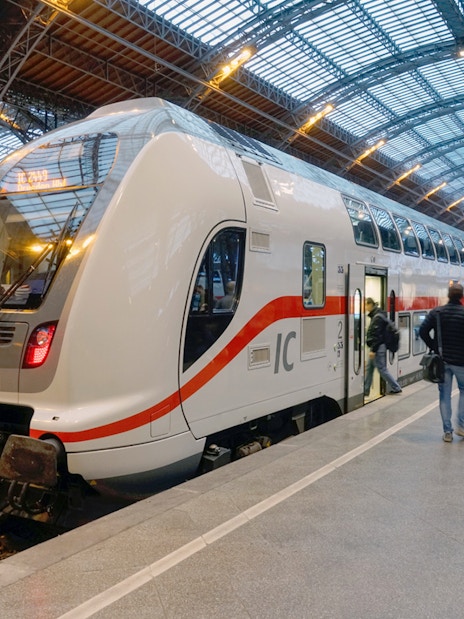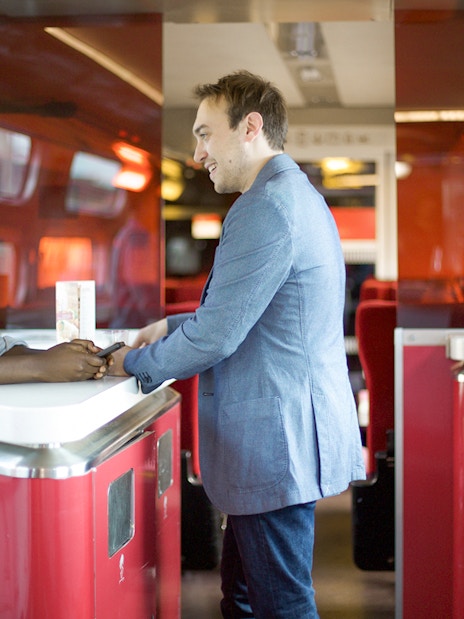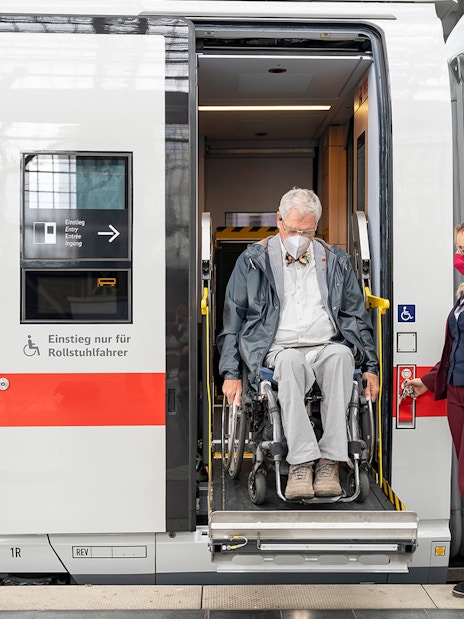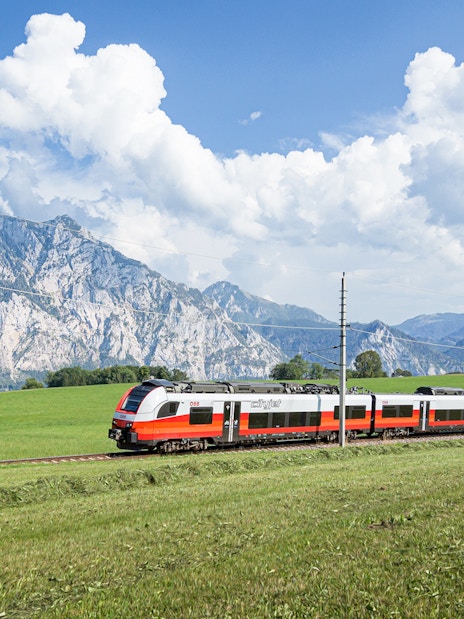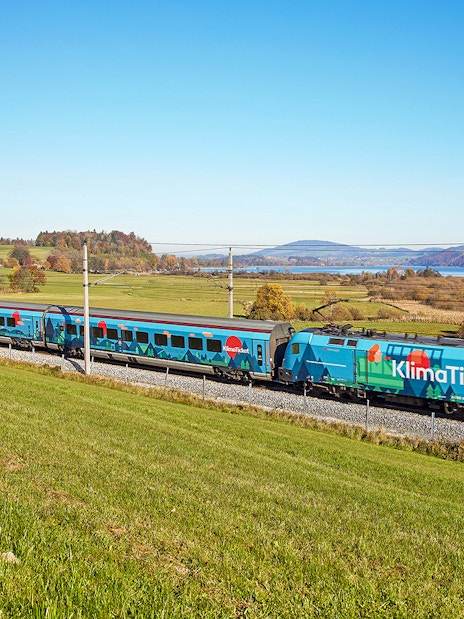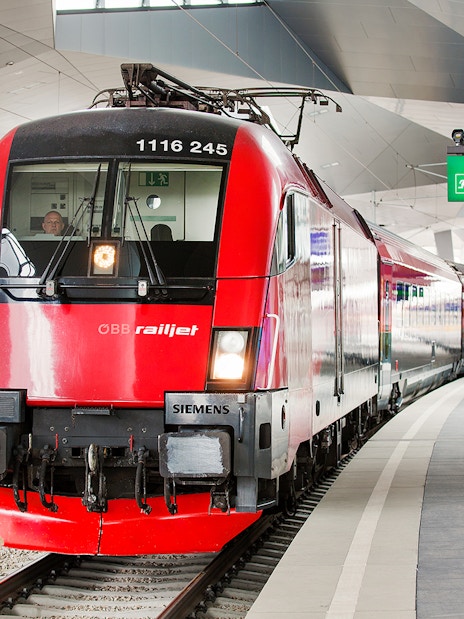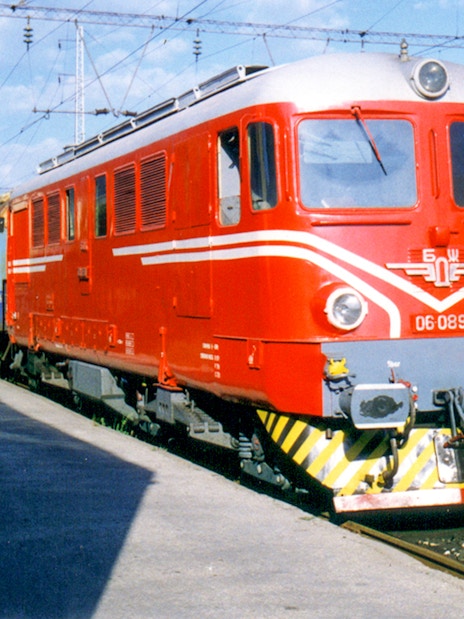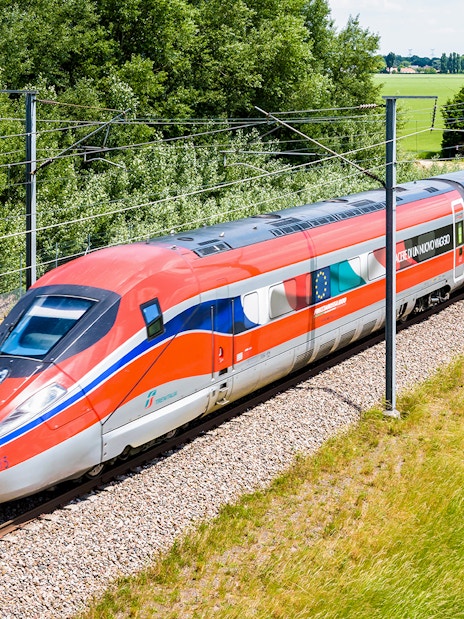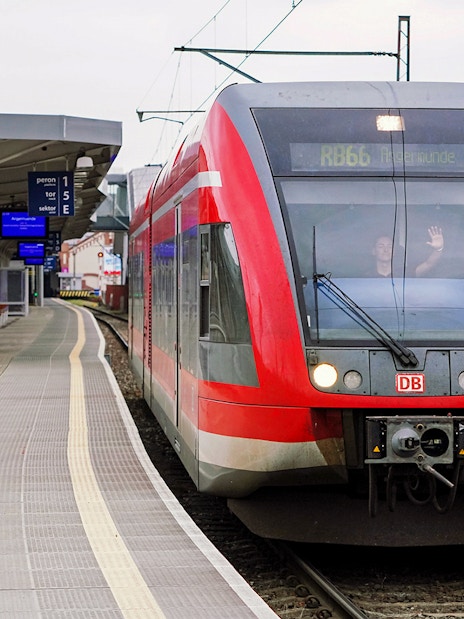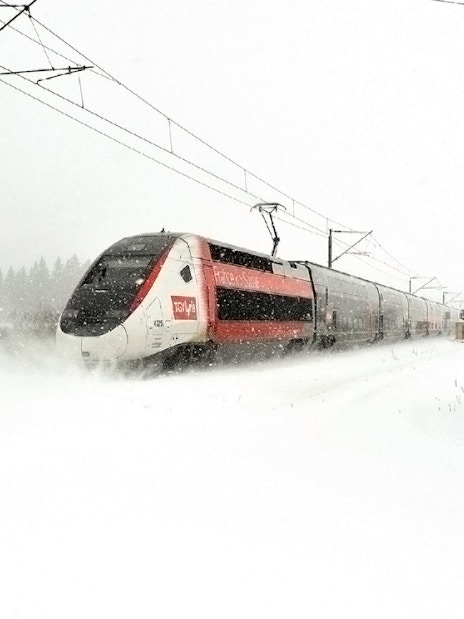Germany by train
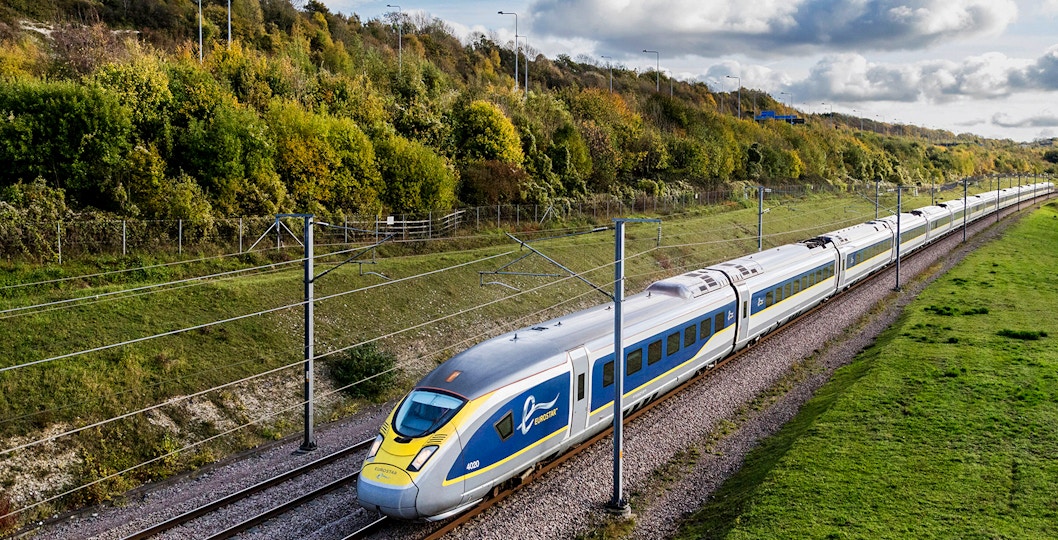
- With the Eurail Mobile Continuous Pass, choose from 3, 4, 5, 7, 10, or 15 days of travel on all major trains and suburban metros of Germany
- Hop onto famous cities like Berlin, Munich, Frankfurt and more with just one pass.
- There's more, this pass isn't just limited to Germany. Explore some cool spots in Switzerland, Austria, Belgium, and Italy, thanks to the DB trains.
- Cruise in 2nd class carriages, making friends with fellow adventurers, and swapping amazing travel stories.
- Here's the cherry on top, no need to deal with paper passes. Snag your paperless mobile pass on the Eurail app before your first train ride.
- With the Eurail Mobile Continuous Pass, choose from 3, 4, 5, 7, 10, or 15 days of travel on all major trains and suburban metros of Germany
- Hop onto famous cities like Berlin, Munich, Frankfurt and more with just one pass.
- There's more, this pass isn't just limited to Germany. Explore some cool spots in Switzerland, Austria, Belgium, and Italy, thanks to the DB trains.
- Cruise in 2nd class carriages, making friends with fellow adventurers, and swapping amazing travel stories.
- Here's the cherry on top, no need to deal with paper passes. Snag your paperless mobile pass on the Eurail app before your first train ride.
Inclusions
- 3/4/5/7/10/15 days pass in Germany
- 2nd class seats
- Access to ICE high-speed trains, InterCity (IC) and EuroCity (EC) trains
- 50% off on steamer boats on Lake Constance
- Access to German S-Bahn (suburban metro railways)
- 20% off on domestic sailings by KD German Rhine Line Köln
- 50% off on tickets on Vulkan-Express between Brohl and Engeln
- Tip: Pick how long you want your pass to last based on how many cities you want to check out! This way, you can enjoy exploring without any stress.
- This pass is specific to non-EU residents. It cannot be sold to residents of Europe, the Russian Federation and Turkey.
- Seat reservation at an additional cost to the rail pass is mandatory for trains that need a reservation.
- Children under 4 can travel for free only on trains where separate seats/bed reservation is not required.
- First, install the latest version of the Rail Planner app to load your pass. On the app, go to My Pass section, tap ‘Add your Pass’ and then enter your surname and Pass number (you will find the number on the confirmation email).
- To connect a trip, create a new trip and give it a name.
- Activate your pass by entering your passport or ID number and choose your first date of travel: this will be the first day you will use your pass.
- If you aren’t sure about the dates, you can activate it up until the day you start traveling.
- Search for routes and schedules, and add it to “My Trip.” Show it to ticket inspectors on the day of your travel.
- The pass is valid up to 11 months after your purchase date.
- Free cancellation anytime before the start of your experience
- These tickets are valid for 11 months from the date of purchase.
Enjoy unlimited train rides in top German cities at 15% off until April 1!
- Jump into a fantastic journey with the Interrail Mobile Continuous Pass and access unlimited train and metro rides across the country.
- Choose from 3, 4, 5, 7, 10, or 15 days of validity. The passes have to be used continuously depending on the validity selected.
- Exploring iconic cities like Berlin, Munich, Frankfurt, and more, all with just one pass.
- This pass isn't limited to Germany alone, thanks to the high-speed DB trains that will transport you to the landscapes of Austria, Belgium, Italy, and more.
- Make friends with fellow passengers and swap incredible travel stories in the 2nd class carriages.
- The paperless mobile pass can be accessed on the Interrail app and can be validated before you even step onto your first train.
Enjoy unlimited train rides in top German cities at 15% off until April 1!
- Jump into a fantastic journey with the Interrail Mobile Continuous Pass and access unlimited train and metro rides across the country.
- Choose from 3, 4, 5, 7, 10, or 15 days of validity. The passes have to be used continuously depending on the validity selected.
- Exploring iconic cities like Berlin, Munich, Frankfurt, and more, all with just one pass.
- This pass isn't limited to Germany alone, thanks to the high-speed DB trains that will transport you to the landscapes of Austria, Belgium, Italy, and more.
- Make friends with fellow passengers and swap incredible travel stories in the 2nd class carriages.
- The paperless mobile pass can be accessed on the Interrail app and can be validated before you even step onto your first train.
Inclusions
- 3/4/5/7/10/15 days Interrail Pass in Germany
- 2nd class seats
- Access to ICE high-speed trains, InterCity (IC) and EuroCity (EC) trains
- Access to German S-Bahn (suburban metro railways)
- 50% off on steamer boats on Lake Constance
- 20% off on domestic sailings by KD German Rhine Line Köln
- 50% off on tickets on Vulkan-Express between Brohl and Engeln
- Tip: Make sure to pack essentials such as snacks and water as some routes can take a while to reach your destination.
- This pass is specific to EU residents.
- If you're a German resident, you can't get a German Rail Pass. Also, you can only use Interrail One Country Passes for trains in the specified country, and you can't buy one for your own country.
- Seat reservation at an additional cost to the rail pass is mandatory for trains that need a reservation.
- Children under 4 can travel for free only on trains where separate seats/bed reservation is not required.
- First, install the latest version of the Rail Planner app to load your pass. On the app, go to My Pass section, tap ‘Add your Pass’ and then enter your surname and Pass number (you will find the number on the confirmation email).
- To connect a trip, create a new trip and give it a name.
- Activate your pass by entering your passport or ID number and choose your first date of travel: this will be the first day you will use your pass.
- If you aren’t sure about the dates, you can activate it up until the day you start traveling.
- Search for routes and schedules, and add it to “My Trip.” Show it to ticket inspectors on the day of your travel.
- The pass is valid up to 11 months after your purchase date.
- Free cancellation anytime before the start of your experience
- These tickets are valid for 11 months from the date of purchase.
- Save money and hassle of purchasing multiple train tickets with this
Eurail Mobile Flex Pass is valid for one month. - Cruise through all the German cities such as Berlin, Munich, and Frankfurt, on ICE trains, InterCity (IC), EuroCity (EC) trains and German S-Bahn metros.
- With a pass in hand, hop on DB trains and whisk yourself away to famous spots in Switzerland, Austria, Belgium, and Italy.
- Join the fun in 2nd class carriages, where you can make friends with fellow travelers and swap the most jaw-dropping travel stories
-Use your pass effortlessly on the Eurail app, and you're all set even before you step foot on that first train.
- Save money and hassle of purchasing multiple train tickets with this
Eurail Mobile Flex Pass is valid for one month. - Cruise through all the German cities such as Berlin, Munich, and Frankfurt, on ICE trains, InterCity (IC), EuroCity (EC) trains and German S-Bahn metros.
- With a pass in hand, hop on DB trains and whisk yourself away to famous spots in Switzerland, Austria, Belgium, and Italy.
- Join the fun in 2nd class carriages, where you can make friends with fellow travelers and swap the most jaw-dropping travel stories
-Use your pass effortlessly on the Eurail app, and you're all set even before you step foot on that first train.
Inclusions
- 3/4/5/7/10/15 days pass in Germany
- Valid for one month
- 2nd class seats
- Access to ICE high-speed trains, InterCity (IC) and EuroCity (EC) trains
- Access to German S-Bahn (suburban metro railways)
- 50% off on steamer boats on Lake Constance
- 20% off on domestic sailings by KD German Rhine Line Köln
- 50% off on tickets on Vulkan-Express between Brohl and Engeln
- Tip: Make the most of the pass discounts and grab offers on Lake Constance streamer boat rides and heritage class rides between Brohl and Engeln.
- Note that the Flex pass is valid for a month. If you've picked a 3-day pass, you can use the pass for any 3 days within one month or so on.
- This pass is specific to non-EU residents. It cannot be sold to residents of Europe, the Russian Federation and Turkey.
- Seat reservation at an additional cost to the rail pass is mandatory for trains that need a reservation.
- Children under 4 can travel for free only on trains where separate seats/bed reservation is not required.
- First, install the latest version of the Rail Planner app to load your pass. On the app, go to My Pass section, tap ‘Add your Pass’ and then enter your surname and Pass number (you will find the number on the confirmation email).
- To connect a trip, create a new trip and give it a name.
- Activate your pass by entering your passport or ID number and choose your first date of travel: this will be the first day you will use your pass.
- If you aren’t sure about the dates, you can activate it up until the day you start traveling.
- Search for routes and schedules, and add it to “My Trip.” Show it to ticket inspectors on the day of your travel.
- The pass is valid up to 11 months after your purchase date.
- Free cancellation anytime before the start of your experience
- These tickets are valid for 11 months from the date of purchase.
Explore Germany with this flexi pass & get offers on public transport. Snag 15% off til April 1, 2025!
- The Interrail Mobile Flex Pass lets you travel across Germany for 3/4/5/7/10/15 days, all valid for a month.
- Discover the vibrant cities of Berlin, Munich, and Leipzig, and set your sights on iconic destinations in Switzerland, Austria, Belgium, and Italy.
- Zoom between locations with ease using high-speed ICE trains, InterCity (IC) and EuroCity (EC) trains, and German S-Bahn (suburban metro railways).
- The excitement gets better with your 2nd class tickets as you can connect with fellow travelers and share unforgettable moments.
- Say goodbye to paper passes and get the pass with one click effortlessly through the user-friendly Interrail app.
Explore Germany with this flexi pass & get offers on public transport. Snag 15% off til April 1, 2025!
- The Interrail Mobile Flex Pass lets you travel across Germany for 3/4/5/7/10/15 days, all valid for a month.
- Discover the vibrant cities of Berlin, Munich, and Leipzig, and set your sights on iconic destinations in Switzerland, Austria, Belgium, and Italy.
- Zoom between locations with ease using high-speed ICE trains, InterCity (IC) and EuroCity (EC) trains, and German S-Bahn (suburban metro railways).
- The excitement gets better with your 2nd class tickets as you can connect with fellow travelers and share unforgettable moments.
- Say goodbye to paper passes and get the pass with one click effortlessly through the user-friendly Interrail app.
Inclusions
- 3/4/5/7/10/15 days Interrail pass in Germany
- Valid for one month
- 2nd class seats
- Access to ICE high-speed trains, InterCity (IC) and EuroCity (EC) trains
- Access to German S-Bahn (suburban metro railways)
- 50% off on steamer boats on Lake Constance
- 20% off on domestic sailings by KD German Rhine Line Köln
- 50% off on tickets on Vulkan-Express between Brohl and Engeln
- Note that the Flex pass is valid for a month. If you've picked a 3-day pass, you can use the pass for any 3 days within one month or so on.
- This Interrail Pass is specific to EU residents. Non-EU citizens need to purchase the Eurail Pass.
- If you're a German resident, you can't get a German Rail Pass. Also, you can only use Interrail One Country Passes for trains in the specified country, and you can't buy one for your own country.
- Seat reservation at an additional cost to the rail pass is mandatory for trains that need a reservation.
- Children under 4 can travel for free only on trains where separate seats/bed reservation is not required.
- First, install the latest version of the Rail Planner app to load your pass. On the app, go to My Pass section, tap ‘Add your Pass’ and then enter your surname and Pass number (you will find the number on the confirmation email).
- To connect a trip, create a new trip and give it a name.
- Activate your pass by entering your passport or ID number and choose your first date of travel: this will be the first day you will use your pass.
- If you aren’t sure about the dates, you can activate it up until the day you start traveling.
- Search for routes and schedules, and add it to “My Trip.” Show it to ticket inspectors on the day of your travel.
- The pass is valid up to 11 months after your purchase date.
- Free cancellation anytime before the start of your experience
- These tickets are valid for 11 months from the date of purchase.
(Limited Time: 15% Off) Eurail Global Flexible Pass: Choose Any 4 to 15 Days Within 30/60 Days
Grab this flexi train pass at 15% off till April 1, 2025 & explore Europe with room for spontaneity.
- Don't burn cash on multiple tickets! Get the affordable Eurail Flexible Pass, which gives you the ultimate freedom to travel anytime before its validity ends.
- Embark on a 33-country adventure across Europe and enjoy easy access to stunning train routes along the Alps, high-speed trains, and regional carriers.
- Select a 4/5/7-day pass with 30-day validity or a 10/15-day pass with 60-day validity, and enjoy 1st-class superior coaches or 2nd-class standard comfort.
- Download the Rail Planner app instead of printing a pass. Just activate the pass, scan at the platform, and walk past the ticketing lines onto the coaches.
Grab this flexi train pass at 15% off till April 1, 2025 & explore Europe with room for spontaneity.
- Don't burn cash on multiple tickets! Get the affordable Eurail Flexible Pass, which gives you the ultimate freedom to travel anytime before its validity ends.
- Embark on a 33-country adventure across Europe and enjoy easy access to stunning train routes along the Alps, high-speed trains, and regional carriers.
- Select a 4/5/7-day pass with 30-day validity or a 10/15-day pass with 60-day validity, and enjoy 1st-class superior coaches or 2nd-class standard comfort.
- Download the Rail Planner app instead of printing a pass. Just activate the pass, scan at the platform, and walk past the ticketing lines onto the coaches.
Inclusions
- Access to the rail network in 33 European countries
- Access to all major carriers, including regional, cross-border, scenic, night & high-speed trains
- Validity: 4/5/7 days within 30 days or 10/15 days within 60 days after activation (based on option selected)
- 1st class or 2nd class seats (based on option selected)
- Discounts across Europe on top attractions, hotels & ferry trips
- Special rates for youths and seniors
Exclusions
- Reserved seats
- Seat/bed reservations for mandatory bookable trains need to be purchased via the Rail Planner app at an additional cost.
- This pass cannot be sold or used by residents of Europe, as well as by some other nationalities, including the Russian Federation, Turkey & Iran.
- 4/5/7-day passes are valid for 30 days after activation, and 10/15-day passes are valid for 60 days after activation.
- The pass must be activated through the Rail Planner App within 11 months after the date of purchase and before the first travel.
- Your Eurail Pass is fully mobile! Activate it in the Rail Planner App using the Pass Number from your confirmation email.
- After activation, add your journey to get a QR code ticket in the app that must be presented to the inspectors at the station.
- Don’t forget to reserve seats for trains that require bookings – do it early via the Rail Planner app!
- Free cancellation anytime before the start of your experience
- These tickets are valid for 11 months from the date of purchase.
(Limited Time: 15% Off) Eurail Global Continuous Pass: Choose 15 Days to 3 Months
Enjoy non-stop European adventure with this pass for continuous travel. Save 15% till April 1, 2025!
- Travel to every nook of Europe in style and save money with the Eurail Global Continuous Pass, enjoying 1st class luxury or 2nd class standard comfort.
- Major regional carriers, high-speed trains, and scenic routes across 33 European countries are yours to discover with just one pass in hand.
- Pick from 15/22 days or up to 3 months of continuous travel, and hop on a train whenever the mood strikes.
- Enjoy the simplicity of a digital pass – activate your Eurail pass by downloading the Rail Planner app, and directly access platforms at train stations.
Enjoy non-stop European adventure with this pass for continuous travel. Save 15% till April 1, 2025!
- Travel to every nook of Europe in style and save money with the Eurail Global Continuous Pass, enjoying 1st class luxury or 2nd class standard comfort.
- Major regional carriers, high-speed trains, and scenic routes across 33 European countries are yours to discover with just one pass in hand.
- Pick from 15/22 days or up to 3 months of continuous travel, and hop on a train whenever the mood strikes.
- Enjoy the simplicity of a digital pass – activate your Eurail pass by downloading the Rail Planner app, and directly access platforms at train stations.
Inclusions
- Access to the rail network in 33 European countries
- Access to all major carriers, including regional, cross-border, scenic, night & high-speed trains
- Validity: Continuous use for 15/22 days or 1/2/3 months
- 1st or 2nd class seats (based on option selected)
- Discounts across Europe on top attractions, hotels & ferry trips
- Special rates for youths and seniors
Exclusions
- Reserved seats
- Seat/bed reservations for mandatory bookable trains need to be purchased via the Rail Planner app at an additional cost.
- This pass cannot be sold or used by residents of Europe, as well as by some other nationalities, including the Russian Federation, Turkey & Iran.
- The pass must be activated through the Rail Planner App within 11 months after the date of purchase and before the first travel.
- Your Eurail Pass is fully mobile! Activate it in the Rail Planner App using the Pass Number from your confirmation email.
- After activation, add your journey to get a QR code ticket in the app that must be presented to the inspectors at the station.
- Don’t forget to reserve seats for trains that require bookings—do it early via the Rail Planner app!
- Free cancellation anytime before the start of your experience
- These tickets are valid for 11 months from the date of purchase.
Types of train passes in Germany

Eurail Pass
- Eligibility: Non-European residents
- Pass coverage: Valid on trains across 33 European countries or all trains within Germany
- Pass options: Customize your pass with Global/One-Country, Flexi/Continuous, and First/Second Class options
- Recommended tickets: Eurail Flexible Global Pass: 33 European Countries | Eurail Mobile Flex 2nd Class Pass: Germany | Eurail Continuous Global Pass: 33 European Countries

Interrail Pass
- Eligibility: European residents
- Pass coverage: Valid on trains across 33 European countries or all trains within Germany
- Pass options: Tailor the pass to meet your itinerary with Global/One-Country, Flexi/Continuous, and First/Second Class options
- Recommended tickets: Interrail Flexible Global 2nd Class Pass: 33 European Countries | Interrail Continuous Global 1st Class Pass: 33 European Countries | Interrail Mobile Flex 2nd Class Pass: Germany

- Unlimited travel: A train pass lets you board on and off trains as much as you want within a period, unlike a ticket that imposes limitations on your journey.
- Great connectivity: Germany has an intricate and efficient rail system. The German rail pass is your best bet for unlimited travel to even remote corners of the country.
- Flexibility: The flexibility accorded by a German train pass serves both planned and spontaneous trips. You can also create a pass that works for you by customizing it.
- Convenient: Say goodbye to ticket queues and the stress of last-minute ticket purchases with the convenience of the digital German rail passes.
- Cost-Effective: Rail passes save you the service charges that may be incurred on offline ticket purchases. They are also more economical for multiple train rides.
- Scenic rides: Get cozy and gaze at the splendid scenery that passes by you on the scenic train routes in Germany, accessible with the German pass.
- Reduced pricing policies: Youth, children, and senior citizens can usually avail of reduced-priced passes, making the German rail passes more affordable.

- Plan your trip: Planning reduces stress and last-minute mishaps. Check train schedules and requirements to maximize your pass benefits.
- Seat reservations: Most German trains do not require reservations. As seat reservation costs are not included in the pass, make reservations if mandatory. We suggest making them for long-distance trains during peak season.
- Boarding trains: Arrive early at stations for a relaxed journey. Familiarize yourself with the German names of the stations. Check train times on Deutsche Bahn's website.
- Night trains: Save time and accommodation costs with night trains, leaving days for exploration.
- Travel light: Pack light for easier movement. However, trains offer ample luggage storage.
- Class of travel: Invest in first-class passes if you travel more by long-distance trains as they have comfy seats, more space, and electrical sockets for long rides.
How to choose a train pass for Germany?
Your residency, travel itinerary, and comfort requirements come into play when choosing a German rail pass.

Where you live determines the choice between Interrail and Eurail Pass. Make sure you have proper proof of residence when opting for either of the passes.
Interrail Pass
- Best suited for: European residents exploring by trains
Eurail Pass
- Best suited for: Non-European residents traveling by trains

Once you have decided between Eurail or Interrail, you will have to choose between a Global Pass or a One-Country Pass.
Global Pass
- Best suited for: Exploring Germany & other European destinations
- Travel across 33 European nations including Germany
One-Country Pass
- Best suited for: Tourists exploring Germany alone
- Covers train journeys within Germany only

The choice between Flexi/Flexible Pass and Continuous Pass is easier if you have a rough travel itinerary. The actual number of days you plan to travel by train will determine the choice.
Flexi Pass
- Best suited for: Passengers with plans for paced-out train rides
- Active for a select number of days within a timeframe
- The travel days needn’t be consecutive
Continuous Pass
- Best suited for: Passengers with plans for more frequent train connections without many breaks
- Once activated, the pass is valid continuously
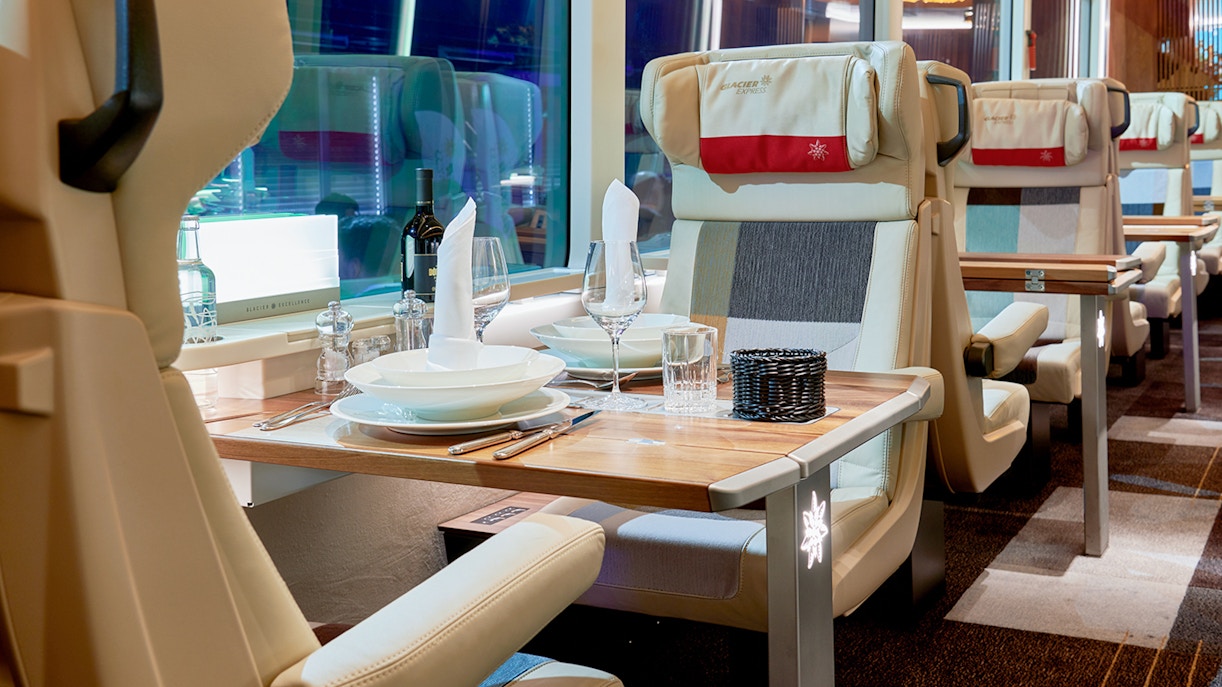
Your travel style, privacy needs, and budget will be deciding factors when choosing between 1st or 2nd class German rail passes.
1st class
- Best suited for: Travelers who prefer a private journey with more comfort
- Better amenities like bigger and cozier seats and tables, more space, legroom, and power accessibility
2nd class
- Best suited for: Travelers on a budget
- Meet more like-minded travelers while enjoying a comfortable yet affordable travel experience
Popular train networks in Germany
Deutsch Bahn is the primary National Rail operator in Germany. There are almost 452 other registered rail operators like Flixtrain, providing cheap rail services. The trains can be broadly classified into three categories - long-distance, regional, and local trains. Germany is also connected by train to other European countries like Denmark, Poland, the Czech Republic, Austria, Switzerland, France, Luxembourg, Belgium, and The Netherlands.
Popular attractions in Germany

There is plenty to experience in Germany. While nature shines best in the German countryside, the cities of Munich, Berlin, Hamburg, and Leipzig elegantly club modernity with the nation's cultural and artistic heritage. All these diverse cities, often flanked by mighty rivers, are linked together by fast and frequent trains, accessible with train pass.
- Berlin: The capital city of Germany, Berlin is steeped in history and has awesome music festivals and parties. Get cultured at Museum Island, climb the Berlin TV Tower, and gorge on craft beers and sausages.
- Munich: Though famed for Oktoberfest, Munich has a lot more up its sleeve. Trace its history at the Marienplatz, and Nymphenburg Palace, shop at Viktualienmarkt, visit Allianz Arena and BMW Headquarters, and try some authentic Bavarian cuisine.
- Hamburg: The largest port city in Germany, Hamburg’s energy is infectious during the Hamburger Dom fair and the Reeperbahn Festival. The neon lights of the St Pauli neighborhood and its Beatlesplatz are sure to lure you in.

Germany has a lot to offer to its visitors. Check out the monuments and memorials that tell the tale of Germany's royal past, and World War II history. The world-class museums demand a tour of their own. Get your energy pumped for Germany’s incredible nightlife and music festivals. Wind down by stepping away from the bustling cities to the German countryside. All the while, craft beers, and sausages will keep your tummy and heart full.
- Neuschwanstein Castle: Give wings to your fairytale fantasies at the beautiful Neuschwanstein Castle perched atop the Bavarian Alps.
- Dachau Tours: A visit to the first concentration camp under the Nazi regime is bound to stay with you for long. Pay respects to almost 40,000 people who lost their lives to torture at the camp, now a memorial and museum.
- Mercedes Benz Museum: Automobile enthusiasts hold Germany in high regard for its innovative automobile industry and the Mercedes Benz Museum is going to be an extra thrilling and educative experience.

The best time to visit Germany depends on your preferences for weather, crowd levels, and activities when visiting Germany.
- Summer months from June to August are packed with festivals and is the peak tourist season in Germany. If you want to be part of these outdoor activities, summer is the best.
- Late spring from April to June and early fall from September to October are ideal for those wishing to skip the crowds of summer and enjoy milder weather. However, there is a spike in tourists during the Oktoberfest which starts in September.
- Though the winter months of November to February are cold and daylight hours short, they are ideal for those seeking Christmas markets and winter sports in the Bavarian Alps. Winter is generally a low season.

- Capital: Berlin
- Official language: German
- Currency: Euro (€)
- Iconic landmarks: Brandenburg Gate, Neuschwanstein Castle, Cologne Cathedral, Berlin Wall
- Climate: Temperate with seasonal variations; mild summers and cold winters
- Population: Approximately 83 million

- Historic landmarks: Germany boasts iconic sites like Brandenburg Gate, Cologne Cathedral, and Neuschwanstein Castle, each steeped in rich cultural heritage. Get your history right about Germany’s royal past and World War II at these landmarks & museums.
- Vibrant cities: Immerse in the incredible nightlife and subcultures that prevail in various German cities. Berlin pulsates with art and culture, Munich exudes Bavarian charm, & Hamburg dazzles with its maritime heritage.
- German festivals: Germany’s cultural calendar is jam-packed with beer, folk, art, and film festivals like Oktoberfest, Berlinale, classical music fests in Bonn and Leipzig, and more. Don’t miss the Christmas markets if visiting during the holidays.
- Charming countryside: Venture beyond the cities and explore the picturesque landscapes of the Rhine Valley, Bavarian Alps, and Moselle wine region, dotted with quaint villages.
- Beers & cuisine: Satisfy your hunger pangs with world-class beers, hearty sausages, pretzels, schnitzels, apple strudel, and Black Forest gateau.

- Use public transportation: Germany has an excellent public transportation system. The train network will efficiently transfer you from city to city. Consider purchasing transit passes for unlimited travel.
- Explore free attractions: Take advantage of the many German museums, parks, and historical sites offering free admission on certain days or times.
- Visit off-season: Traveling during the off-peak season (spring & autumn) can save you money on accommodations and attractions.
- Learn basic German: Learning basic German can help you navigate better.
- Tipping culture: Tipping is not mandatory in Germany, but rounding up the bill for good service is appreciated.
- Free wifi: Use free Wi-Fi in cafes, restaurants, and public spaces to save on mobile data charges. Avoid roaming fees by getting a local SIM card, available at airports or mobile stores.
- Walk or bike to explore: Explore the city by walking or biking, utilizing bike-sharing programs available in many German cities for cost-effective transportation.

- Language: German
- Time zone: Central European Time (CET), UTC+1
- Currency: Euro (€)
- Country code: +49
- Socket type: Type F
- Emergency numbers: Police: 110; Fire and Ambulance: 112
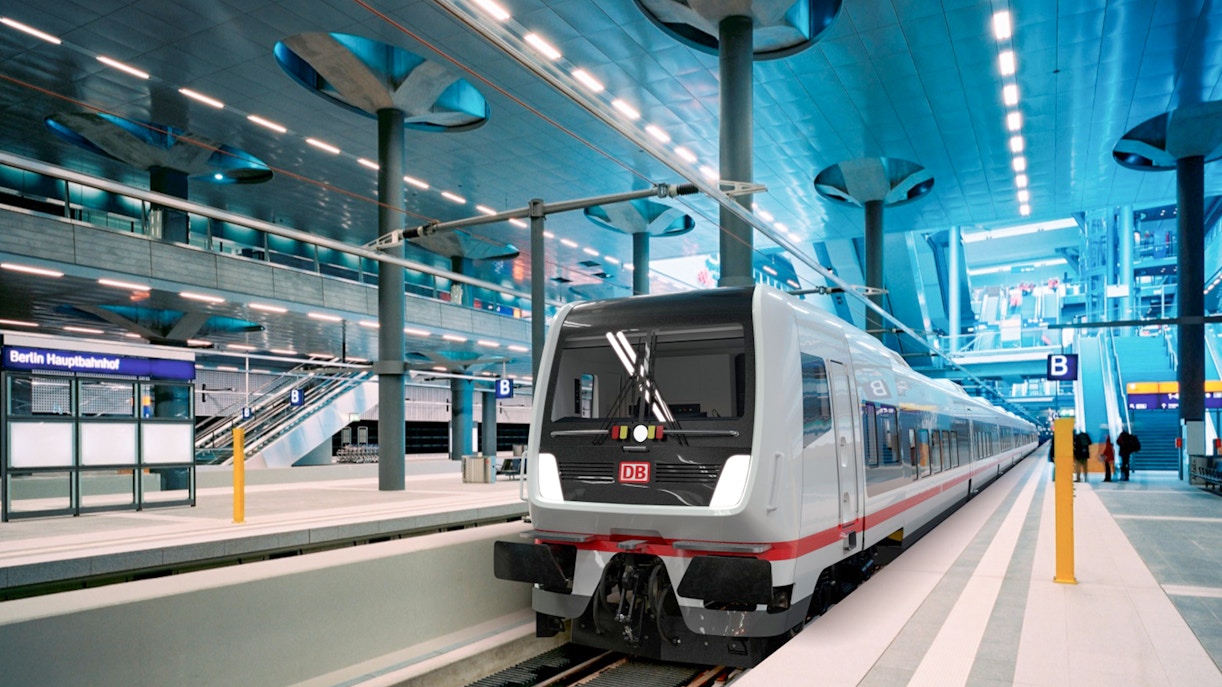
- Trains: Germany's extensive train network, primarily operated by the Deutsche Bahn (DB), connects major cities, towns, and regions. Deutsche Bahn offers high-speed trains (ICE) & regional trains (RE and RB). Get a Eurail or Interrail Pass for a seamless train commute.
- Buses: Intercity buses operated by companies like FlixBus offer affordable travel options between cities and regions, complementing the train network.
- Trams & Light Rail: Many German cities, including Berlin, Stuttgart, Munich, & Frankfurt, have efficient tram and light rail systems that provide easy access to local attractions and neighborhoods.
- Subway & Metro: Larger cities like Berlin, Munich, Hamburg, & Cologne have subway (U-Bahn) and suburban rail (S-Bahn) systems that offer convenient transportation within cities and their outskirts.
- Taxis: Taxis are widely available in urban areas and can be hailed on the street.
- Bicycles & walking: Many cities in Germany have well-developed bike lanes and bike-sharing systems and are also pedestrian-friendly.
Frequently asked questions
You can purchase a Eurail Pass if you are a non-European resident or an Interrail Pass if you are a European resident to access the train networks in Germany.
If you plan on traveling extensively by train in Germany, opting for a German rail pass offers the most cost-effective and flexible means of seamlessly connecting between cities and towns and even within cities.
German rail passes prices start from €200 but vary with the type of pass, validity, and inclusions.
The first class offers a more premium experience with better seats, more space, power access, and often at-seat catering. These are ideal for long-distance journeys. The second class is pocket-friendly, accommodates more people, and is better suited for shorter train rides.
Non-European residents should opt for a Eurail Pass for swift train rides in Germany. If you plan to cover Germany and other European countries, choose a Eurail Global Pass, but if you need to connect only within Germany, choose a Eurail Germany Pass. European residents can opt for Interrail Passes.
To assess whether a German train pass suits your journey, plan a rough itinerary detailing the number of train trips you anticipate. Compare the total cost of individual tickets with the pass price to gauge their affordability. Additionally, consider the flexibility you desire during your travels. German train passes offer great flexibility as opposed to train tickets.
Most trains in Germany do not require reservations. However, we recommend them on long-distance trains during high season. Reservation is often not possible for regional or local trains. Learn more about Eurail seat reservations and Interrail seat reservations.


